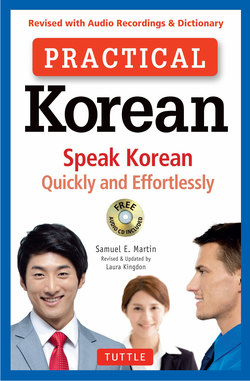Читать книгу Practical Korean - Samuel E. Martin - Страница 13
На сайте Литреса книга снята с продажи.
ОглавлениеLESSON 6
Some Useful Expressions
Unless otherwise specified, all expressions in this chapter are in the familiar polite style, which is by far the style you’ll need most frequently. It’s appropriate for adults, whether they are strangers or whether you know them a little. You’ll need a different style to talk to close friends or children, and that's covered on page 42.
Aseyo?
아세요?
Do you understand?
or
Ihaehaseyo?
이해하세요?
Do you understand?
Ne.
네.
Yes. (Often pronounced ye in the South.)
Ani.
아니.
No. (Informal)
Aniyo.
아니요.
No. (More polite)
Alayo.
알아요.
I understand.
Mollayo.
몰라요.
I don’t understand.
Dasi mal hae juseyo.
다시 말해 주세요.
Please say it again.
Cheoncheon(h)i mal hae juseyo.
천천히 말해 주세요.
Please say it slowly.
Chaek-eul boseyo.
책을 보세요.
Please look at your book.
Chaek-eul boji maseyo.
책을 보지 마세요.
Please don’t look at your book.
Hangungmal-lo haseyo.
한국말로 하세요.
Please talk in Korean.
Yeongeo-ro mal haji maseyo.
영어로 말하지 마세요.
Please don’t talk in English.
Gachi halkkayo?
같이 할까요?
Let’s do it (say it) together.
Da gachi.
다 같이.
All together.
Deutgi-man haseyo.
듣기만 하세요.
Just listen please.
Geureoseyo?
그러세요?
Is that so? Oh? Really?
(Or, the more casual expression:)
Geurae(yo)?
그래(요)?
Is it? Is that so? Oh, really?
Geureyo.
그래요.
That’s so. Yes. That’s it. (Same as above, but with different intonation).
Geureochiman....
그렇지만....
But…. However….
Geurigo....
그리고....
And (in addition)....
Geuraeseo....
그래서....
And so…. So….
….gatta jusipsio.
갖다 주십시오.
Please bring me….
